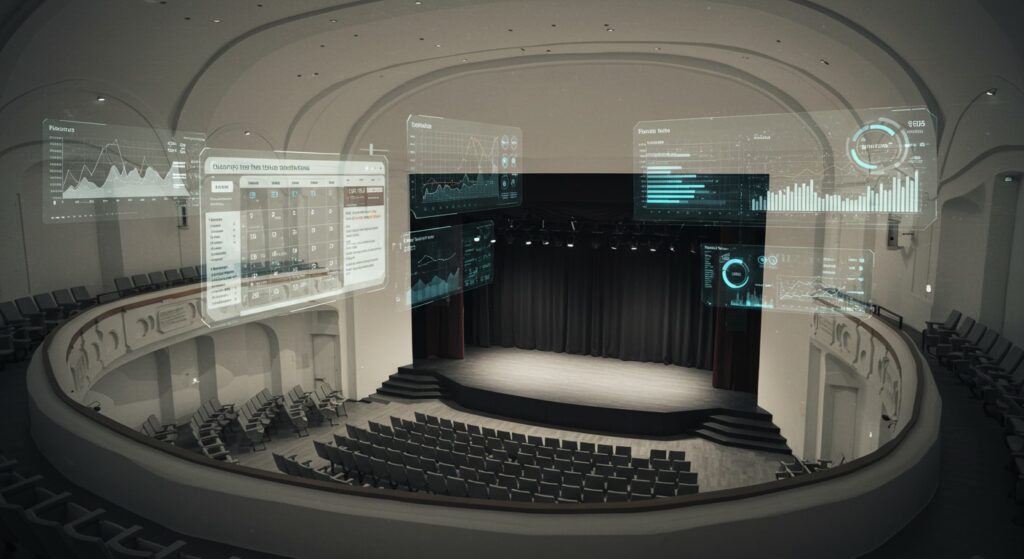
What to Consider When Starting a Live Music Venue
Whether you already own a bar or restaurant and want to attract more customers, or you believe there’s room in the local market for a new space, starting a live music venue is always an enticing idea.
We know that Billboard’s list of shuttered venues paints a daunting picture of the industry, but now that live events are bouncing back, it’s a good time to ride the wave and take the leap of faith by starting a live music venue. This guide will take you through starting a live music venue, from initial considerations to finding a tool that will help you organize everything for your venue.
Things to Consider When Starting a Live Music Venue
Before you get ahead of yourself, there are plenty of things to think about before you put a security deposit or a down payment on a space to call your own. Yes, owning a live music venue has its perks, but it’s not all glitz and glamor. It takes a significant amount of persistence and dedication, just like any other startup.
If you’re serious about starting a live music venue, lay a solid foundation by thinking about the following things (if you haven’t already).
Are You Looking at the Right Location?
Location is everything when it comes to live music venues. Before you do anything else, you should consider the neighborhood where you want to start your music venue. The demographics of the people living in the area you choose should match the typical type of fans for the artists you plan to host in your venue.
Knowing which genres perform well in a specific neighborhood will inform how you style and place your venue. It may be helpful to explore music streaming statistics sorted by city to get a clearer picture of what people are listening to in your chosen area.
Is There an Opening in the Market?
Starting a live music venue is like launching any other business—there has to be a gap in the market. Filling a hole in the market could mean creating a small nightclub venue in a small town with no other live music space. In some cases, the gap in the market may be what makes the venture risky–like opening up a punk rock club in Nashville, where there are primarily country venues.
How Would Your Venue be Different from the Other Venues Nearby?
Piggybacking on finding an opening in the market, you have to make sure that your venue would offer a unique experience to the people in that area. Especially if you’re in a location where there are a plethora of live music venues, there needs to be a reason why people will go to your place instead of the one down the road. Sometimes, that can be as easy as booking the right artists or offering an Insta-worthy photo-op spot.
Do You Have the Budget to Get Everything You Need?
There’s nothing more frustrating for an audience than being at a concert with poor sound quality. If you’re going to start a live music venue, you need to be able to afford decent equipment so people can actually hear the performer. Aside from equipment, you’ll also need enough room in your budget to pay the artists, event staff, and utilities, all while having enough left over for marketing campaigns and, hopefully, a profit.
Related: What You Need to Know About Music Venue Profitability
What You Need to Start a Live Music Venue
From a purely business standpoint, some things you may need for starting your live music venue include:
- A name
- A logo
- A business license
- A food and drink permit
- Food and beverage options
- A business bank account
- A business credit card
- Business capital
- A location with a stage and space for people to gather
- Sound equipment
- Marketing materials
- Staff members
Common Roadblocks to Starting a Live Music Venue
Aside from the current market conditions in the post-COVID industry, people often falter when starting a live music venue because of complications that they didn’t anticipate. Understanding which obstacles to look out for can help you navigate rough waters as you get your venue off the ground. Here are a few to consider.
Improper Budgeting
Not having the right budgeting tools can bankrupt your business before it gets off the ground. Before you can really get your venue going, you need to make sure that you have the capital and the income to, at the very least, break even on your first couple of events. Trying to budget with a spreadsheet just won’t cut it if you’re serious about this venture. You’ll want to easily and efficiently track the multitude of expenses to determine what the numbers tell you about your next step.
Noise Restrictions
Before you commit to a specific venue, you need to check the noise restrictions in the neighborhood. The last thing you want is to be deep in your investment and suddenly realize that you’re gonna get the cops called on you if the band is still going after 11 pm.
Ineffective Advertising
Marketing is crucial for new venues. Without people in seats, you won’t be able to keep the doors open. And let’s be honest, you’ll have a billion other things to do because you’re launching a business. If you want your venue to be successful, then you’ll need to hire someone who specializes in marketing. Ideally, this person will understand the music industry and how to use social media to get people to buy tickets.
Related: Venue Management Software: Why You Need It NOW
Steps to Take to Launch a Live Music Venue
As you can see, starting a live music venue isn’t all rock-and-roll. But if you’re still here, that means you’re serious about this. So let’s break down the steps you need to take to open a killer venue.
1. Do Your Research
Did we mention that starting a venue requires a lot of research? Unless you’re already well-versed in the music industry in your area, you’ll need to examine the demographics in your potential venue’s neighborhood, possible competitors in and out of the music industry, how much everything will cost, and everything in between. If you’re not an expert, you need to become one.
2. Pick Your Space
Besides finding the right location, your venue will need to evoke a certain atmosphere. There’s a massive difference between a corner stage at a bar and Carnegie Hall. Once you find the right building for your venue, you’ll need to determine how many people you can (safely) fit inside and how you’ll decorate to create ambiance.
3. Invest in Equipment
Since you’re just starting out, you don’t need to buy the top-of-the-line tech equipment, but you do need good equipment, as we mentioned earlier. And don’t forget that depending on the other things you’re offering in your venue, you might also need tables, chairs, glassware, flatware, linens, and menu boards. In some cases, you can rent this equipment until you have enough capital to purchase your own.
4. Hire Your Team
Hire the right people for your crew, including booking agents, box office staff, managers, marketing specialists, sound and lighting technicians, cleaning personnel, cooks, dishwashers, waitresses, bartenders, doormen, and security guards.
5. Start Booking Talent and Advertising
Now comes the fun part. Find artists who are willing to play sets for a price that’s within your budget. You can use your various online channels to market your venue to people looking for a place to perform. If you want bigger name artists to attract more people, you may want to pursue sponsorship for your venue. Once the contracts are signed, advertise the shows to promote ticket sales.
6. Price Your Tickets
Pricing your tickets can be especially tricky for new venue owners. Price too high, and people won’t buy the tickets; price too low, and you won’t make a profit. Look at what other venues in your area are charging for tickets for similar shows, and go from there. If you need more help with pricing your tickets, check out this article.
7. Provide an Incredible Experience for Everyone
This seems like a given, but once your venue is up and running, the last step is to consistently give your customers their money’s worth. Of course, there will be mishaps from time to time, but the more you do to ensure a phenomenal experience, the more likely people are to return to your venue over and over again.
How Venue Management Software Can Help Streamline the Process of Starting a Live Music Venue
As you can see, a lot goes into starting a live music venue. Once you’ve opened the doors and hosted your first concert, you have to focus on keeping your business afloat with the right venue management software. The good news is that you don’t have to do it alone.
With an integrated live music event management software, you’ll be able to schedule and manage your venue with ease. Your entire team will be able to stay on the same page with real-time updates about bookings, expenses, and deadlines. Any time you need to adjust your calendar, you’ll be able to just drag and drop the event information.
You won’t have to worry about budgeting miscalculations because your software will automatically generate reports and track your revenue and expenses, so you always know exactly where you stand financially. And if you can implement this from the beginning, you won’t have to worry about straying too far off course in the most crucial time for your venue.
Prism is the perfect software for you because it was designed for music venue owners with all levels of experience. Getting Prism now will set the standard for your venue’s tenure by helping you navigate rough patches and keeping everything in order. See how Prism can help you achieve your dream of starting a live music venue and schedule your demo today.

Matt Ford is the founder and CEO of Prism.fm, an Austin-based software company revolutionizing live music event management. With a background in entrepreneurship and a degree from the University of Wisconsin-Madison School of Business, Ford combined his self-taught coding skills with firsthand experience as a concert promoter to address the inefficiencies he observed in the industry. In 2018, he launched Prism.fm, an all-in-one platform designed to streamline operations for venues, promoters, and agencies by replacing cumbersome spreadsheets with integrated tools for booking, financial tracking, and contract management. Under his leadership, Prism.fm has grown significantly, achieving $3 million in annual recurring revenue post-COVID and securing over $15 million in funding . Ford’s commitment to building user-centric solutions has positioned Prism.fm as a trusted partner for over 1,500 venues and promoters worldwide.


